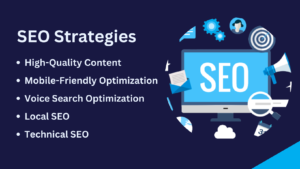In 2023, search engine optimization (SEO) continues to play a vital role in helping businesses improve their online visibility and attract organic traffic. To stay ahead in the digital landscape, here are some of the best SEO techniques that are necessary for businesses in 2023:
- High-Quality Content: Creating high-quality, relevant, and engaging content remains a cornerstone of effective SEO. Businesses should focus on producing valuable content that addresses their target audience’s needs and provides comprehensive information on relevant topics. Content should be well-written, optimized with relevant keywords, and structured in a user-friendly manner.
- Mobile-Friendly Optimization: With the increasing use of mobile devices, optimizing websites for mobile is crucial. Businesses should ensure their websites are mobile-responsive, fast-loading, and provide a seamless user experience across different devices. Mobile optimization is not only essential for user satisfaction but also a ranking factor in search engine algorithms.
- Voice Search Optimization: Voice search continues to gain popularity, and businesses should adapt their SEO strategies to optimize for voice queries. This includes using conversational language, incorporating long-tail keywords, and providing concise, direct answers to commonly asked questions.
- User Experience (UX) Optimization: User experience is a critical aspect of SEO in 2023. Search engines prioritize websites that offer a positive user experience. Businesses should focus on fast-loading pages, easy navigation, intuitive design, and clear calls-to-action. Optimizing website speed, reducing bounce rates, and enhancing overall user engagement can positively impact search engine rankings.
- Featured Snippets and Structured Data: Featured snippets, also known as position zero, are becoming increasingly prominent in search results. Businesses should optimize their content to provide concise, well-structured answers to commonly asked questions, increasing the chances of appearing in featured snippets. Additionally, implementing structured data markup can help search engines understand and display relevant information about the business, such as reviews, ratings, and product details.

- Local SEO: For businesses targeting specific geographic areas, local SEO is crucial. Optimizing for local search involves creating and optimizing Google My Business listings, including accurate business information (name, address, phone number), obtaining positive customer reviews, and optimizing content with location-specific keywords.
- Technical SEO: Technical SEO ensures that search engines can effectively crawl, index, and understand a website’s content. Businesses should focus on technical aspects such as optimizing website speed, improving site architecture, using proper header tags, optimizing meta tags and descriptions, and creating XML sitemaps. Regular monitoring of website health, fixing broken links, and ensuring mobile compatibility are also essential.
- Backlink Building and Digital PR: High-quality backlinks from authoritative and relevant websites continue to be important for SEO. Businesses should focus on creating valuable, shareable content that naturally attracts backlinks. Engaging in digital PR activities, such as guest blogging, influencer collaborations, and participating in industry-related events, can help build brand awareness and earn quality backlinks.
- Social Media Integration: While social media signals are not direct ranking factors, businesses should integrate their SEO and social media strategies. Sharing content on social media platforms can increase visibility, attract engagement, and potentially generate backlinks. Additionally, social media profiles often rank in search engine results, enhancing the overall online presence.
- Continuous Monitoring and Adaptation: SEO is an ever-evolving field, and businesses should regularly monitor their SEO performance, track keyword rankings, analyze website traffic, and stay updated on algorithm changes. By staying proactive and adapting their strategies based on data and industry trends, businesses can maintain a competitive edge in the SEO landscape.
Remember that SEO is a long-term strategy, and results may take time to materialize. It is essential to invest in sustainable SEO techniques and stay committed to providing valuable content and a positive user experience.


